#Benjamin Wilkinson
Explore tagged Tumblr posts
Text
BENJAMIN WILKINSON from BUFFY THE VAMPIRE SLAYER

JUSTIFICATION:
"Here's to all the trans girlies out there who's experience of gender is killing some pathetic loser guy and taking over his body! Cheers!" - @coolblackmetal666
Reminder: Submissions are always open! Submit here!
#could transition have saved her#benjamin wilkinson#buffy the vampire slayer#btvs#transgender#trans hc#coolblackmetal666#night of frights
11 notes
·
View notes
Text
Seventeen as Buffy the Vampire Slayer Characters (S Coups, Jeonghan, Joshua & Jun)
Choi Seungcheol as Robin Wood

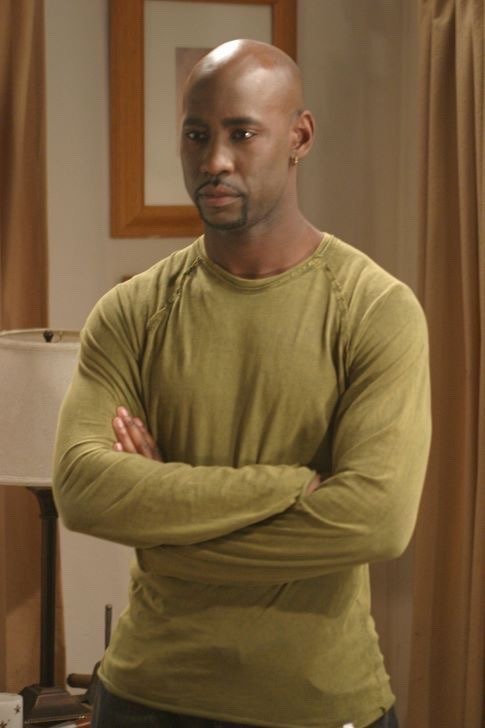
Yoon Jeonghan as Spike

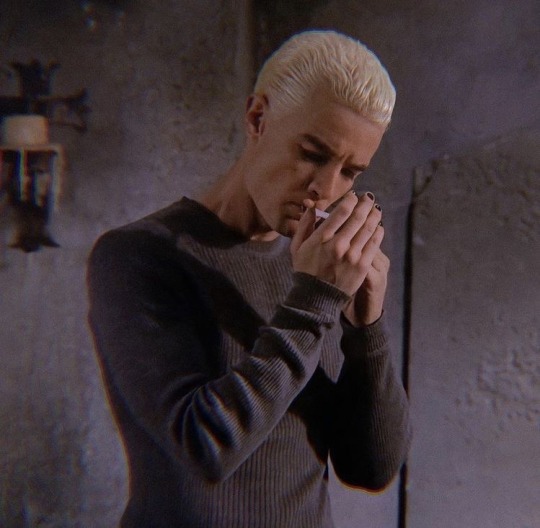
Hong Joshua as Riley Finn

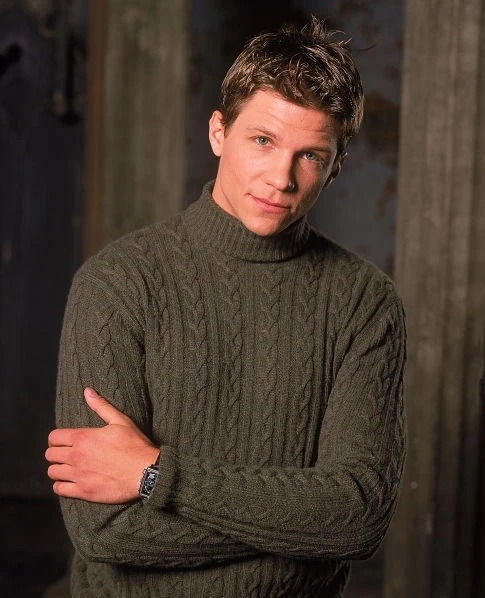
Wen Junhui as Benjamin Wilkinson

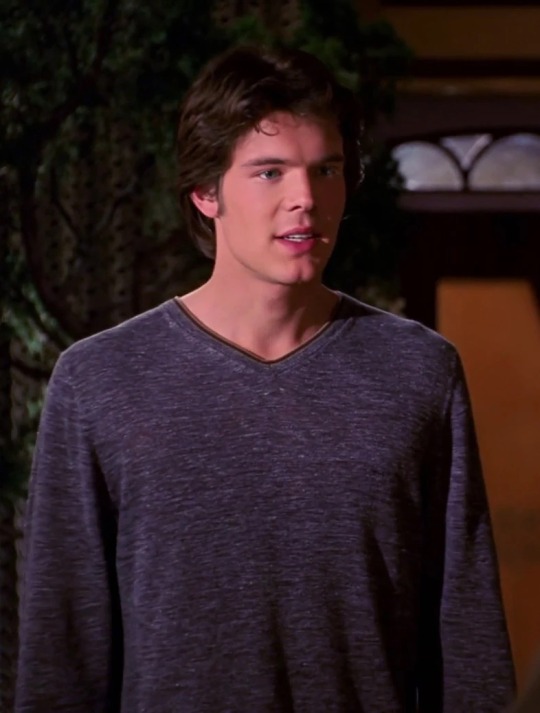
#seventeen#buffy the vampire slayer#kpop#btvs#seungcheol#jeonghan#joshua#jun#choi seungcheol#yoon jeonghan#hong joshua#wen junhui#robin wood#spike#william the bloody#riley finn#benjamin wilkinson#ben is glory
10 notes
·
View notes
Text
TRAP HOUSE (2023) Reviews of Tubi Original horror thriller
Trap House is a 2023 American horror thriller film about an undercover police detective who infiltrates a madman’s bobby-trapped meth lab. Directed by Nicholas Humphries (Project Ithaca; Mermaid’s Song; ABCs of Death 2.5 “M is for Messiah”; Death Do Us Part) from a screenplay written by Jordan Robinson (Requiem for a Scream; Dangerous Snow Day). Produced by Graem Luis, Stan Spry and Eric Scott…
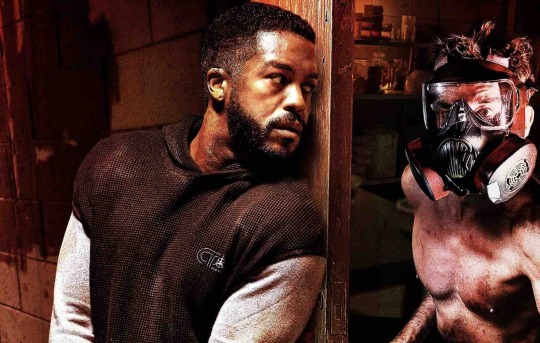
View On WordPress
#2023#Benjamin Wilkinson#Bruce Crawford#Gigi Saul Guerrero#horror thriller#Jaime M. Callica#Nicholas Humphries#Peter Bundic#review reviews#Trap House#Tubi Original
2 notes
·
View notes
Text

Bad movie I have The Adam Project 2022
#The Adam Project#Ryan Reynolds#Walker Scobell#Mark Ruffalo#Jennifer Garner#Zoe Saldana#Catherine Keener#Alex Mallari Jr.#Braxton Bjerken#Kasra Wong#Lucie Guest#Donald Sales#Esther Ming Li#Benjamin Wilkinson#Isaiah Haegert#Milo Shandel#Ellie Harvie#Charles Chi Soo Kim#James Lawson
1 note
·
View note
Text
Thugs, Gentlemen, and Queers: Braveheart's English vs The Patriot's British
Another bewildering part of audiences seeing The Patriot as the spiritual, if not the literal, sequel to Braveheart is the idea that the first film already did all the work of making the English despicable. And they are indeed all English, even the one in the latter film whose surname could not be more Irish. The conflation of the English and British villains, and I use the term loosely regarding The Patriot, is even more egregious than the comparison of Scots and South Carolina Colonials. While the English in Braveheart are mostly on the same page throughout, there is a more sustained ideological conflict among the antagonists of The Patriot than among its heroes.
The English, in general, are brutal thugs who function as oppressors of the Scots on multiple levels. The main villain of the film is the King of England, but his edicts empower the lowest of English soldiers as well as lords to see the Scots as existing for their personal use. Not all the English characters are pure evil. Wallace's executioner beheads him rather than leaving him to suffer disembowelment and dismemberment alive even though he does not--and I cannot stress enough how much he does not--say the magic word! But enough of them are that the Scots' opinion of them feels warranted. Meanwhile, British officers in The Patriot, almost the only British characters who speak, are gentlemen by action as well as title, with one notable exception. The one who thanks Martin for helping wounded British soldiers is far more representative of the norm than Colonel Tavington, but once Tavington shoots his son, Martin's memory of that man is deleted. He's the first of many officers Martin has killed as proxies for Tavington while leaving Tavington alone to go through Colonial children like a smallpox epidemic. All the while, the remaining officers view Tavington as a pariah and are angrier with him for failing to stop the militia than with Martin until they discover how Martin has abused their trust.
All this aside, the single thing about The Patriot that justifies my watching it in part or whole every single year, as I unfortunately do, is its main British villain. Occasionally I do run across a commentor who describes Tavington and Longshanks as though there is no difference between them, and I can only assume that person watched both films with their Mel Gibson blinders firmly in place. Not only is Jason Isaacs significantly younger than Patrick McGoohan, but Tavington as a dragoon colonel has significantly less power than the fucking king. Longshanks is an old man nearing the end of a life spent accumulating as much power as possible by being as ruthless as possible to all his subjects. His fear is that his son will lose it all once he takes the throne, not by being kind but by being weak and gay, attributes Longshanks refuses to distinguish, and the film does nothing but back him up on this. Young Edward is a sniveling little nothing of a character, and I need to rewatch Derek Jarmon's Edward II (1991) with its joyously queer titular character to get that taste out of my mouth. Meanwhile, Tavington is a comparatively young man who actually has nothing but the opportunity to win lands for himself. There is a disapproving older man, but he is General Cornwallis, and his relationship with Tavington is far more interesting than that between the two Edwards in Braveheart.
While Longshanks fears what Young Edward will lose, Cornwallis fears what Tavington will take from him, namely his good reputation as a gentleman and a skilled field commander. Tavington's treatment of surrendering Colonial troops and Colonial civilians alike threatens that reputation, but so do his dramatic charges across the field of victory. While Longshanks verbally and physically abuses Edward, Cornwallis tries to reason with Tavington about the consequences of his brutal tactics. But then he changes his mind. Not only does he allow Tavington methods he originally condemned, but the fateful charge he orders at the end of the film is a product of his own vanity. His change from a man who values gentlemanly restraint to one who, like Tavington, values victory at any cost not only makes him more complex than Longshanks but more complex than Benjamin Martin.
The scene that most clearly underlines the differences between The Patriot's antagonists and Braveheart's is the final confrontation between Tavington and Martin. Wallace and Longshanks never meet, on the field of battle or elsewhere, and that is far more owing to Longshanks than Wallace. He pursues the king when he leaves the field at Falkirk only to be apprehended before he can reach him. At Cowpens, Tavington and Martin charge straight at each other. One part of this scene is clearly a call-back to Wallace's anti-cavalry strategy in Braveheart, but Martin unhorsing Tavington does not--and I cannot stress enough how much it does not--help him win that fight. Rather, Martin needs to be rescued from the outcome of that fight by plot contrivance like a damsel in a tower guarded by a dragon (with two "o"s this time).
Anyone who argues that Martin is more badass for stabbing a horse than Tavington for getting up from his fall, taking a bullet in the arm, and still beating Martin to his knees has put an additional pair of Mel Gibson blinders on over the first one. However, I'm going to suggest that there is another, less obvious nod to Braveheart at play here, and that is the contrast between Tavington and Young Edward. Throughout the film, the British are presented as effete, vain, loquacious aristocrats compared to the manly, plain-speaking Colonial "rustics." There is a heavy dose of queer-coding at play here, and Tavington is not exempt from it. Indeed, between his obsession with catching a man he first sees dressed only in his undershirt to his own seduction of his superior officer, I would say he has more than his fair share. The Tavington of Robert Rodat's 1999 script has far more in common with Braveheart's Edward II than he character who appears in director Roland Emmerich's The Patriot. Rodat's Tavington is a cowardly snob who throws his pistol aside when Martin confronts him at the film's end, hoping he will not shoot an unarmed man. Almost all the changes Jason Isaacs suggested and Emmerich implemented have the effect of making Tavington more physically imposing and courageous. He may be cruel, selfish, and greedy, but he is hardly weak. That he is the best fighter in the film while being no less refined and theatrical than his British brethren feels very pointed.
It's easy to see Braveheart as the better overall film of the two because its heroes are compelling, and we spend far more time with them. The English antagonists are serviceable, but Longshanks is the only one who is really memorable. The antagonists in The Patriot are inspired, largely because of excellent performances by Jason Isaacs and the late Tom Wilkinson. There is nuance in the antagonists' relationship that is largely absent from any the film's hero has because he is presented as infallible. It's as though Mel Gibson's performance in Braveheart is so powerful that The Patriot's filmmakers relied on him to carry their story in spite of a lackluster script. For Gibson, playing Benjamin Martin is a vanity project, a place to trot out his well-established fighting and emoting skills in an American setting. Tavington is Jason Isaacs' breakout role, and the difference that makes speaks for itself. That performance is the best thing about The Patriot, and considering it as a response to the worst part of Braveheart puts it a rung above the older film, at least in my ranking.
#braveheart 1995#the patriot 2000#jason isaacs#william tavington#mel gibson#william wallace#benjamin martin#patrick mcgoohan#tom wilkinson
12 notes
·
View notes
Text
📽️ The Choice (2016)
Oh man do I love me a good Nicholas Sparks movie. This one is a classic Nicholas Sparks story, complete with the storyline that will make you cry. The two leads are so good, especially Benjamin Walker. He was perfect for this part. I’ve watched this movie more than once, and I know I’ll watch it again.
Sex/nudity: 2/10 (implied sex, making out, women in bikinis, men making comments on bikinis)
Language: 2/10 (fairly mild, especially for a PG-13 rating)
Violence: 2/10 (spoilers)
Overall rating: 7/10
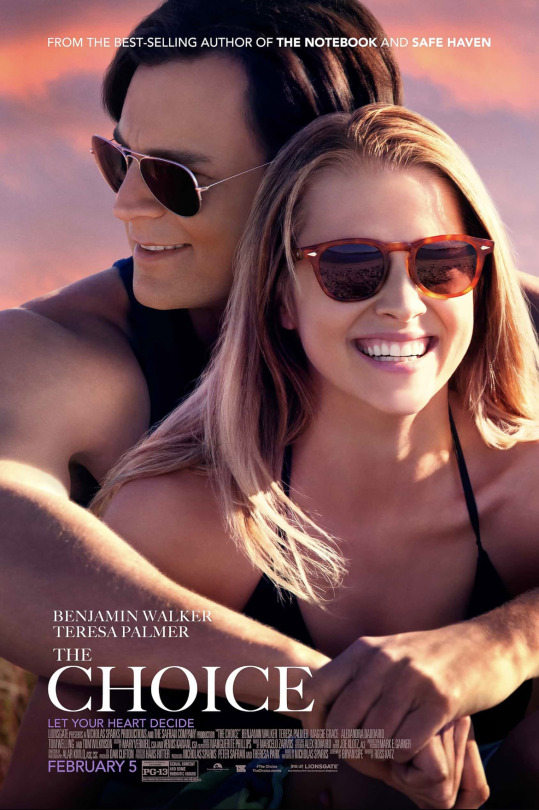
#review#movie#movie review#drama#romance#nicholas sparks#the choice#book to movie#benjamin walker#theresa palmer#maggie grace#alexandra daddario#tom wilkinson#tom welling#ashley campbell
10 notes
·
View notes
Text






tom wilkinson as benjamin franklin in john adams
primetime emmy award winner for outstanding supporting actor in a limited series or movie
4 notes
·
View notes
Text
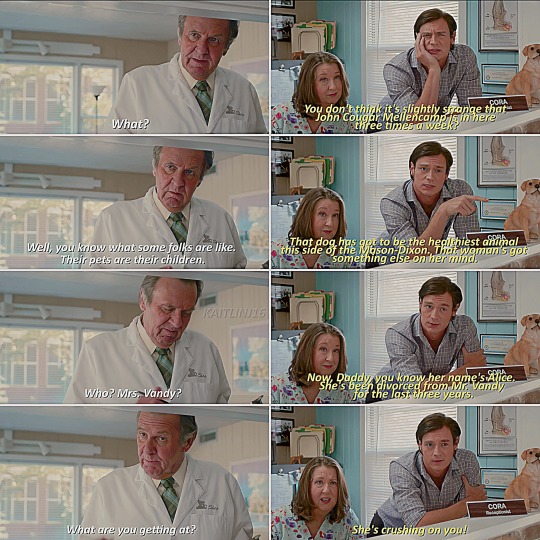
The Choice | 2016
💛💛💛
4 notes
·
View notes
Photo
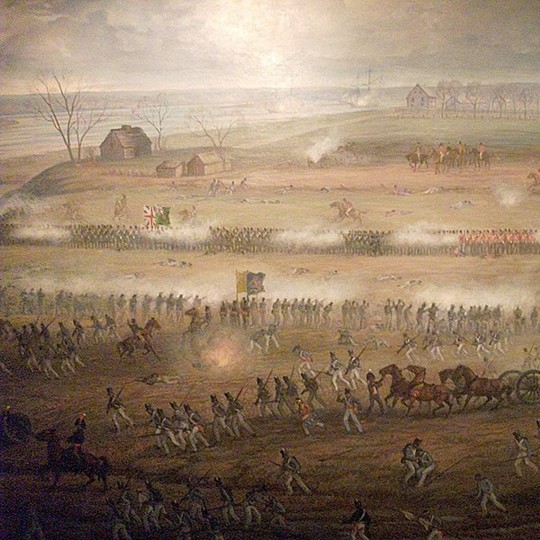
Battle of Crysler's Farm
The Battle of Crysler's Farm (11 November 1813) was a major battle in the War of 1812. Fought along the banks of the St. Lawrence River, it saw a British and Canadian force defeat a much larger American army, thwarting the United States' attempt to capture Montreal.
Battle of Crysler's Farm
Adam Sherriff Scott (Public Domain)
Background
By the autumn of 1813, the St. Lawrence Valley had been left largely untouched by the War of 1812, even though the conflict had been raging for over a year. This was partially because the Americans were focused on taking the Niagara Peninsula for political and strategic reasons, but also because David Parish, one of the largest landowners in the St. Lawrence region, had loaned millions of dollars to the Madison administration in the understanding that the US would leave the valley alone. For a while, Parish's bribes paid off, and the only action along the St. Lawrence were minor raids conducted by US Major Benjamin Forsyth and his riflemen, who attacked and plundered the Canadian settlements of Gananoque and Elizabethtown on their own volition. But by mid-1813, as the Americans fumbled their invasion of Niagara, they began to look at the St. Lawrence Valley as an enticing place to open a new front. After all, the river was a major supply line for British Canada, and its capture could allow the Americans to threaten vital Canadian outposts like Kingston or even Montreal.
Such an operation would be led by Major General James Wilkinson, who had recently replaced the outgoing General Henry Dearborn as commander of all US troops along the New York–Canadian frontier. To say that Wilkinson was controversial would be somewhat of an understatement. He was almost universally disliked; Winfield Scott, one of the army's up-and-coming officers, once said that serving under Wilkinson "was as disgraceful as being married to a prostitute" (quoted in Taylor, 281). Indeed, Wilkinson's reputation for treachery stretched back to the American Revolution, when he was implicated in the Conway Cabal, which had unsuccessfully tried to force General George Washington out of command. Since then, Wilkinson had undermined his superior officer, General Anthony Wayne, in the Fallen Timbers campaign of 1794, and had later plotted with Aaron Burr to illegally attack Mexico – when this conspiracy was uncovered in 1807, Wilkinson threw Burr under the bus to minimize his own involvement. To top it all off, Wilkinson was secretly in the pay of the Spanish, having promised to promote their interests in the American West. His detestable reputation stretched well beyond his own lifetime; President Theodore Roosevelt would later say of Wilkinson that "in all our history, there is no more despicable character" (nps.gov).
The fact that a man like Wilkinson had been given such an important command was a testament to the lack of experienced general officers in the US Army. In late August, he arrived at the military camp at Sackets Harbor, New York, where, despite his unsavory reputation, he was cheered by the men. "General Wilkinson has infused new spirit into the troops at this post," reported one captain. "He inspired a degree of confidence in every officer and soldier that I never saw equaled" (quoted in Taylor, 279). The reason for this outpour of jubilation was because the soldiers were in desperate need of hope – under the sluggish leadership of their previous commander Dearborn, they had suffered defeat after defeat and, moreover, were undersupplied and poorly trained, lacking enough officers to properly drill them. What was worse was that they were suffering from disease caused by their tainted food supply; for weeks now, the men had been subsisting on rotten meat, stagnant water, and bread that was found to have been mixed with bits of soap, lime, and even fecal matter. By September, 700 officers and men were incapacitated by illness, and a month later, that number had doubled. The men, therefore, hoped that this change in command would lead to a change in fortune and would save them from their wretched condition.
James Wilkinson, c. 1820
John Wesley Jarvis (Public Domain)
Shortly after his arrival in Sackets Harbor, Wilkinson met with US Secretary of War John Armstrong, Jr., to concoct a plan. While it was agreed that Wilkinson would lead his 8,000-man army down the St. Lawrence River, the two men disagreed as to their target; Armstrong preferred an attack on Kingston, which housed the main British naval base on Lake Ontario, while Wilkinson advocated for the riskier – yet more glorious – assault on Montreal. The successful capture of Montreal, Wilkinson argued, would sever the British supply line and cut the Canadian provinces in two. Armstrong ultimately relented, viewing the plan with a great deal of optimism. "If our cards are well played," he told Wilkinson, "We may renew the scenes of Saratoga" (quoted in Taylor, 283).
Continue reading...
19 notes
·
View notes
Text
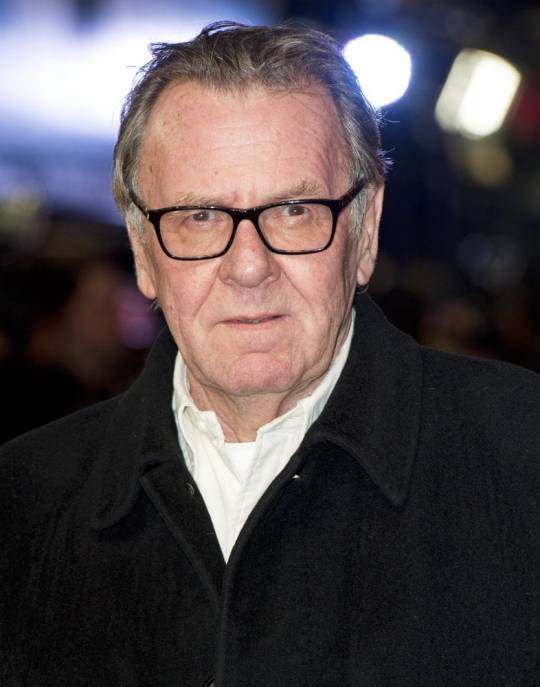
TOM WILKINSON (1948-Died December 30th 2023,at 75).
British actor of film, television, and stage. He received various awards throughout his career, including a BAFTA Award, a Golden Globe, a Primetime Emmy Award and nominations for two Academy Awards.
For his role in the comedy film The Full Monty (1997) he received the BAFTA Award for Best Actor in a Supporting Role. He received two Academy Award nominations, one for Best Actor for In the Bedroom (2001) and the other for Best Supporting Actor for Michael Clayton (2007).
Some of his other notable films include In the Name of the Father (1993), Sense and Sensibility (1995), Shakespeare in Love (1998), The Patriot (2000), Girl with a Pearl Earring (2003), Eternal Sunshine of the Spotless Mind (2004), Batman Begins (2005), Valkyrie (2008), The Best Exotic Marigold Hotel (2011), Selma (2014), The Grand Budapest Hotel (2014), and Denial (2016).
In 2009, he won a Golden Globe Award and a Primetime Emmy Award for Best Supporting Actor in a Miniseries or Film for playing Benjamin Franklin in the HBO limited series John Adams (2008).Tom Wilkinson - Wikipedia
#Tom Wilkinson#British Actors#English Actors#Actors#The Full Monty#Michael Clayton#In the Bedroom#Notable Deaths in December 2023#Notable Deaths in 2023
55 notes
·
View notes
Note
I think it’s super cool you have a website for it. I’ve went through it, I’m looking forward to when your work is on there. I was happy to see you posted about it today too! I’m curious, could you tell me more about those two characters in particular? What’s their dynamic, who or what inspired you to create them? Whatever you wanted to share. I’m sorry if I’m being nosy I’m just genuinely very intrigued, haha. I hope today is good for you, too.
Aw, you're good. I have a lot of lore built up over time regarding the characters. I'm still trying to make it seem moderately coherent.

On the left is MICHAEL and on the right is Ben Wilkinson/The Entity.
MICHAEL, also known as Made In Christ's Holy Almighty Eternal Love, is a part of a UFO cult run by Emlee West. He is one of Emlee's closest confidants, but is still treated as an outsider by the rest of the group. He has this rivalry with Emlee's two other confidants--Charles and Lillian Armstrong. He is intended to be a kind of pathetic and neurotic character. He is desperate to be wanted by someone, to have someone's full attention and love.
This character originated from reading about Unarius and the kind of drama involved after Uriel's death. His closest real life analogue from that group is Antares. MICHAEL's real name is Tomás Cruz--which is a pun, in and of itself. Visually, he is not based off of anyone specifically. I ended up cannibalizing an old oc's design into his current one.
Ben Wilkinson experienced a severe mental break following the suicide of his sister, Margaret. After making his own attempt, he believes that his soul has been replaced by that of an inter-dimensional genderless alien being referred to as "The Entity." He blames Emlee West for Margaret's death and begins planning a poorly thought out revenge plan. He claims to have left his human life as Ben Wilkinson behind, despite clearly having strong ties. He is fueled entirely by grief and anger. His human life prior to Margaret's death was also collapsing into disappointment, her death was the thing that pushed him over into the breakdown.
Ben's real life analogue is Marshall Applewhite from Heaven's Gate. The name Benjamin Wilkinson is kind of a play on Jemima Wilkinson, properly known as the Public Universal Friend. Visually, he's just Anthony Perkins.
As far as their dynamic goes--MICHAEL redirects The Entity's anger/revenge in a way that benefits his own plans. They both see each other as means to an end. The Entity views MICHAEL as his own personal test--to see if he has truly transcended the human vice of lust. MICHAEL initially views The Entity as someone who is easy to manipulate--but ends up becoming more fixated on him over time, solely because he gives MICHAEL true attention.
10 notes
·
View notes
Text
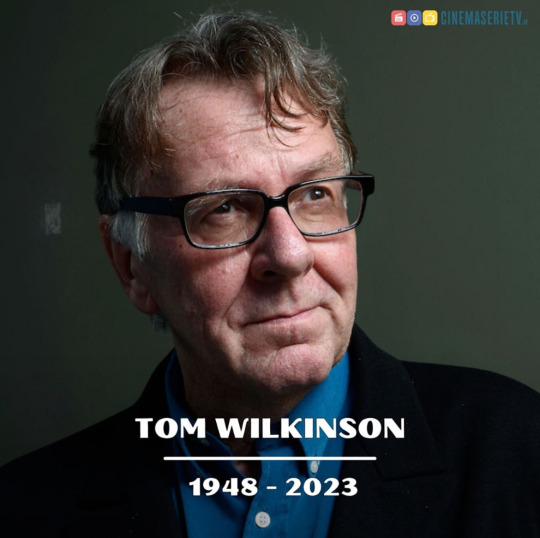
Such sad news to hear today. An amazing, and enigmatic actor someone who deserved to be called a star.💫
British actor Tom Wilkinson, best known for his role in The Full Monty, has died aged 75 💔Wilkinson, who became an OBE for services to drama in 2005, was born in Leeds - Yorkshire in 1948 and grew up in Canada and Cornwall before attending the Royal Academy of Dramatic Art (Rada) in the 1970s.
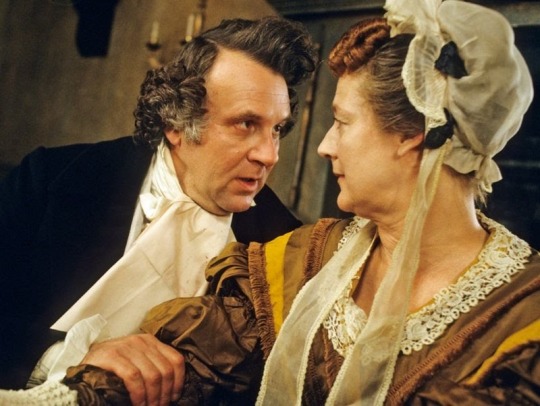
In 1994, he appeared as Pecksniff in the BBC's adaptation of Charles Dickens's Martin Chuzzlewit. He is pictured alongside Maggie Steed.
Across an illustrious career spanning nearly 50 years, Wilkinson won a host of acting awards, as well as two Oscar nominations. He won a BAFTA for 'The Full Monty,' and he also appeared in 'Shakespeare in Love,' 'In the Bedroom,' 'The Best Exotic Marigold Hotel' and 'Batman Begins', He won an Emmy and a Golden Globe for his role as Benjamin Franklin in the 'John Adams' miniseries. A versatile actor won acclaim through decades of work in television and film and onstage. Recently he was reunited with his The Full Monty co-stars, Carlyle and Mark Addy, in a Disney+ series of the same name.
Who remembers this classic!
The original 1997 comedy about an unlikely group of male strippers in Sheffield won an Oscar for Best Original Musical or comedy score and was nominated for three others, including best picture and best director.
Wilkinson’s best roles. Here are his finest films, Lieutenant General Lord Charles Cornwallis was an officer of the British Army and one of the leading British generals in the American War of Independence.
Wilkinson played a British officer in The Patriot, a US film about the Revolutionary War co-starring Mel Gibson, Heath Ledger and Jason Isaacs. The film was nominated for three Academy Awards.
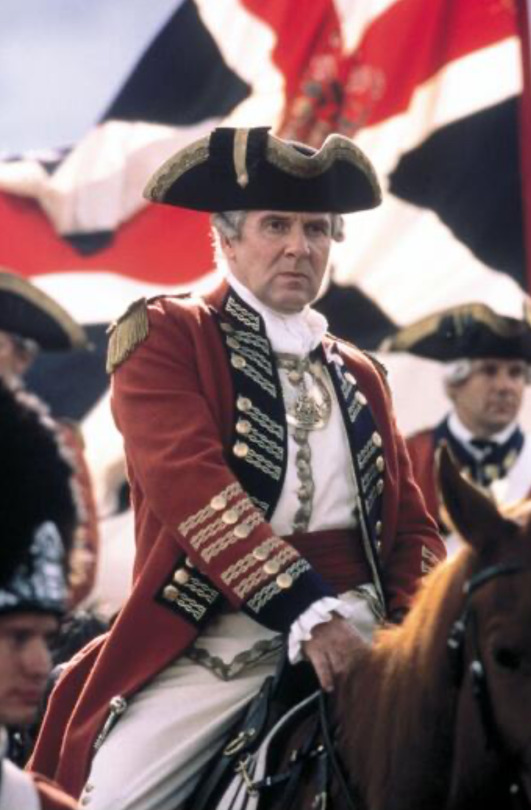
From The Full Monty to Michael Clayton: was a lawyer - Arthur Edens - in Michael Clayton film 🎥 co-starring George Clooney. Tom Wilkinson was nominated for Academy Awards for Best Actor in a Leading Role for In The Bedroom in 2001, and Best Actor in a Supporting Role for Michael Clayton in 2007.
Wilkinson was winning acclaim again as a high-powered lawyer who has a breakdown in Tony Gilroy’s “Michael Clayton.” He was nominated for another Academy Award for his performance in that film.
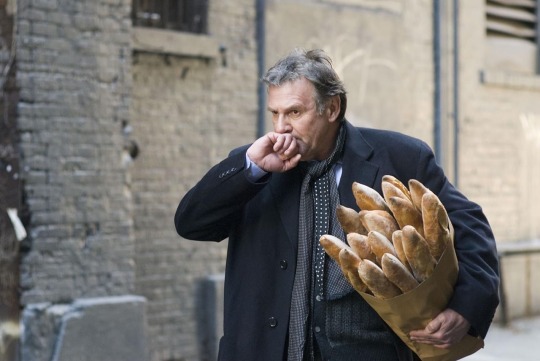
In ‘Denial’, Confronting a Holocaust Revisionist in Court. Denial is a drama about a historian’s pursuit through the UK justice system by a Holocaust denier. It stars Rachel Weisz, Tom Wilkinson, Timothy Spall, Andrew Scott, Jack Lowden, Caren Pistorius and Alex Jennings.
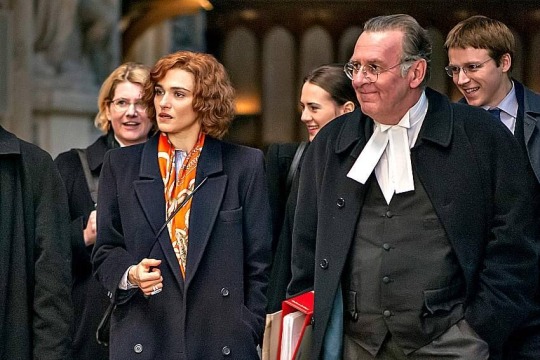
On television, he played Benjamin Franklin in “John Adams,” James A. Baker in “Recount,” for which he was Emmy-nominated and Joseph P. Kennedy, Sr. in “The Kennedys.”
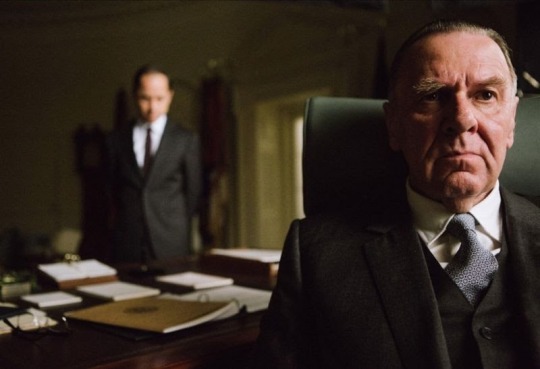
In Ava DuVernay's 2014 historical drama Selma, Wilkinson portrayed President Lyndon B Johnson. The film tells of the protest marches held in Alabama in 1965 over voting rights for African Americans.
RIP Tom Wilkinson 💔 1948-2023
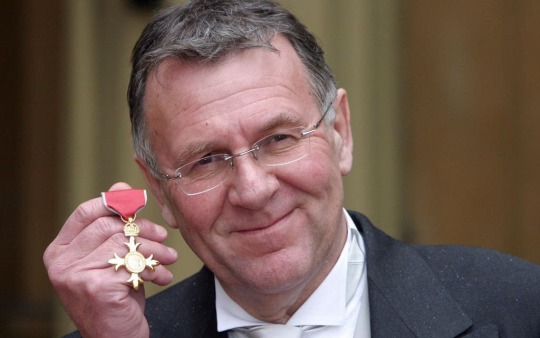
17 notes
·
View notes
Text
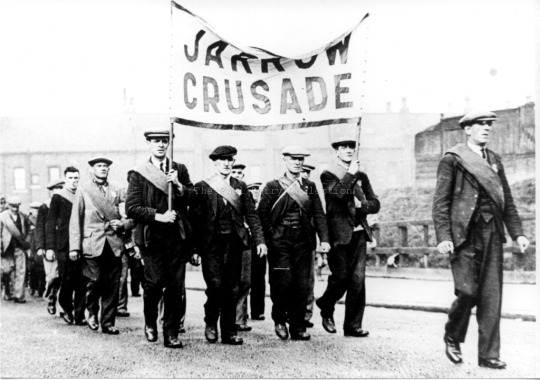
Areas that relied largely upon heavy industry, like the Northeast of England, were hit particularly hard by the Great Depression. On the southern bank of the River Tyne, Jarrow was just one of many industrial communities ravaged by unemployment, poverty, disease and starvation in the 1930s. Meanwhile, the National Coalition Government under Conservative Prime Minister, Stanley Baldwin, appeared to be looking the other way.
'One Nation' Conservatism had seen Baldwin steer the Tory ideology toward a much more compassionate, inclusive and interventionist position, at least in theory. Nineteenth Century Prime Minister Benjamin Disraeli had contended that the divide between rich and poor had rendered Britain 'two nations', between which there was 'no intercourse and no sympathy'.
In a speech in 1924, Baldwin said;
"…We stand for the union of those two nations of which Disraeli spoke two generations ago: union among our own people to make one nation of our own people at home which, if secured, nothing else matters in the world..."
According to Conservative Historian, Lord Alistair Lexden;
"…Tory policy was reshaped to advance the cause of 'One Nation'. Social reform became the Party’s dominant preoccupation for the first time in its history. The Conservative Party, Baldwin declared at the 1929 election, regards the prosperity of trade and industry, not as an end in itself, but as a means to improve the condition of the people…"
In 1986, a Jarrow resident during this period recalled to the BBC;
"…Pathetic. The Jarrow of those days was a filthy, dirty, fallen down consumptive area in which the infantile death rate was the highest in the country, and TB was a general condition…"
Jarrow Labour MP Ellen Wilkinson later wrote;
"…There was no work. No one had a job except a few railwaymen, officials, the workers in the co-operative stores, and a few workmen who went out of the town…The plain fact is that if people have to live and bear and bring up their children in bad houses on too little food, their resistance to disease is lowered and they die before they should…"
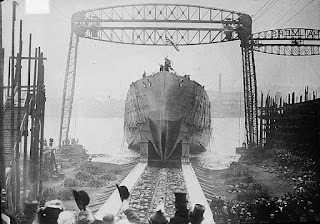
Palmer’s Shipyard, the principal source of employment since 1851, had closed down in 1934. Government unemployment benefits in those days lasted six months, after which responsibility was handed to the Unemployment Assistance Board, from which any tangible support was difficult to access and ultimately far from adequate. Eligibility was also subject to the controversial Means Test, first introduced in 1931. This meant that the combined wages and assets of all members of the household were taken into account when deciding whether or not individual unemployment relief should be forthcoming. In the context of the time, this was particularly humiliating for unemployed men who saw it as their duty to be the family provider.
Facing indifference from Westminster, the local Borough Council initiated a non-partisan campaign to try to bring employment, in the form of a new steelworks, back to the area. Two hundred unemployed men, selected from a pool of around 1400 volunteers, would march more than 280 miles to London to petition the government to establish new industries.
The marchers set off at 11 am on October 5th, 1936. As The Manchester Guardian reported, it wasn’t a hunger march, but a protest march. This was an important distinction in the context of the time, as the hunger march movement was seen as a communist initiative, one short step away from revolution, and a movement from which the mainstream Labour Party was keen to keep its distance. The Guardian also pointed out that at that time, less than 15% of the eligible Jarrow workforce was actually in work.
The Manchester Guardian;
"…There is no political aspect to this march. It is simply the town of Jarrow saying send us work. In the ranks of the marchers are Labour men, Liberals, Tories, and one or two Communists, but you cannot tell who's who..."
"...With the marchers goes, prominently carried, the Jarrow petition for work, a huge book with about 12,000 signatures, which Miss Ellen Wilkinson, MP for Jarrow, is to present at the bar of the House of Commons on November 4th..."
One marcher later recalled to the BBC, in 1977;
"…The spirit of the men was such that we were expecting something. We were expecting to prove to the capital, at that time, that here’s men from Jarrow. The spirit they had shown all the way down…Here we are, we want work and we are going to put our case that we must have work for the benefit of our wives and children…"
The marchers reached London by the end of October. A rally was held in Hyde Park, followed subsequently by the official presentation of the petition to Parliament by Ellen Wilkinson MP. The government remained unmoved, and there proved to be little or no immediate effect on economic or industrial policy. The men returned home by train, courtesy of donated tickets.
According to the UK National Archives;
"...To add insult to injury, the Unemployment Assistance Board officials in Jarrow docked the dole of the marchers because they had not been available for work. After the Jarrow March the Cabinet resolved to convince organisers that marches were unhelpful and caused unnecessary hardship to those taking part..."
Other reports suggest that the Cabinet's attitude was more about deterring any future protest marches, rather than concern for the marchers' welfare. Even the Labour Party itself was, at best, lukewarm in its support. Ellen Wilkinson had addressed their Edinburgh conference on the issue of Jarrow, but had found the agenda dominated by discussions of the Spanish Civil War and issues surrounding rearmament. There was even criticism of the idea of the march itself, and the physical burden it placed on unemployed and starving men.

Marcher Sam Rowland suggested that while the majority of politicians seemed unconcerned, public opinion was markedly different;
"…If the march achieved anything…it made the condition and lives of people a factor that should always be brought into consideration at the top level… and not left to work out their own salvation…"
The Guardian, BBC News and multiple other sources name the last surviving Jarrow Marcher as Con Shiels, who died in 2012, and who had felt that the march had made 'not one hap’orth of difference'.
For some additional context on this, @robbielewis has a fascinating article on Con Whalen, who passed away in 2003. He was the last surviving marcher who had completed the march in its entirety.

https://www.tumblr.com/robbielewis/716998502772785152/cornelius-whalen-the-last-jarrow-marcher?source=share
The next general election was held nearly a decade later, in 1945, as World War Two was coming to an end. Memories of the Depression era National Government and the desperate times of the interwar years would be a key factor in the landslide victory for the Labour Party.
References include BBC News, Liverpool Echo, Manchester Guardian archives, Spartacus Educational, Lord Lexden (Official Historian of the Conservative Party) (Website), BBC Radio 4 - Great Lives (Ellen Wilkinson), BBC Witness -The Great Depression and The Jarrow March, BBC History-Referencing Ellen Wilkinson’s The Town that was Murdered
#social history#uk politics#working class history#social justice#uk government#human rights#history#jarrow march#industrial history#industrial heritage#uk history#british culture#jarrow crusade#tyneside
37 notes
·
View notes
Text
2024: Books
January 1. The Final Curtain (祈りの幕が下がる時) (2013) Keigo Higashino 2. The Last Word (2023) Taylor Adams 3. Unruly (2023) David Mitchell 4. Death in Kashmir (1953) M.M. Kaye # 5. Death of a Bookseller (1956) Bernard J. Farmer † 6. There Should Have Been Eight (2023) Nalini Singh 7. Miss Marple: Complete Short Stories (1985) [1927-1956] Agatha Christie ♥ 8. Murder's a Swine (1943) Nap Lombard † February 9. The Mysterious Case of the Alperton Angels (2023) Janice Hallett 10. Death in Fancy Dress (1933) Anthony Gilbert † 11. The Murder at the Vicarage (1930) Agatha Christie ♥ 12. Everyone on This Train Is a Suspect (2023) Benjamin Stevenson 13. Inheritance (2023) Nora Roberts 14. Someone from the Past (1958) Margot Bennett † 15. The Body in the Library (1942) Agatha Christie ♥ 16. The Extra Woman (2017) Joanna Scutts 17. The Inugami Curse (犬神家の一族) (1951) Seishi Yokomizo March 18. Traitor's Purse (1941) Margery Allingham * 19. The Moving Finger (1943) Agatha Christie ♥ 20. Mother-Daughter Murder Night (2023) Nina Simon 21. Murder in the Mill-Race (1952) E.C.R. Lorac † 22. Club You To Death (2021) Anuja Chauhan 23. A Murder Is Announced (1950) Agatha Christie ♥ 24. Murder by the Book (2021) [1933-1973] Martin Edwards (Editor) † 25. The Choice (Anything You Do Say) (2017) Gillian McAllister
April 26. The Good, the Bad, and the Aunties (2024) Jesse Q. Sutanto ^ 27. They Do It with Mirrors (1952) Agatha Christie ♥ 28. How to Solve Your Own Murder (2024) Kristen Perrin 29. Jumping Jenny (1933) Anthony Berkeley † 30. The Ministry of Fear (1943) Graham Greene 31. A Pocket Full of Rye (1953) Agatha Christie ♥ 32. Close to Death (2024) Anthony Horowitz ^ 33. Betsy-Tacy (1940) Maud Hart Lovelace 34. Betsy-Tacy and Tib (1941) Maud Hart Lovelace 35. Betsy and Tacy Go Over the Big Hill (1942) Maud Hart Lovelace 36. Betsy and Tacy Go Downtown (1943) Maud Hart Lovelace 37. Crook o' Lune (1953) E.C.R. Lorac †
May 38. Deep Waters (2019) [1893-1975] Martin Edwards (Editor) † 39. 4.50 from Paddington (1957) Agatha Christie ♥ 40. The Hike (2023) Lucy Clarke 41. The Spoilt Kill (1961) Mary Kelly † 42. Nightwatching (2024) Tracy Sierra 43. The Mirror Crack'd from Side to Side (1962) Agatha Christie ♥ 44. The Last One (2023) Will Dean 45. The Clue of the Broken Locket (Nancy Drew #11) (1934, rev.1965) Carolyn Keene * June 46. Mind Games (2024) Nora Roberts 47. A Caribbean Mystery (1964) Agatha Christie ♥ 48. The Great Mistake (1940) Mary Roberts Rinehart * 49. Quick Curtain (1934) Alan Melville † 50. One Perfect Couple (2024) Ruth Ware 51. At Bertram's Hotel (1965) Agatha Christie ♥ 52. Big Ben Strikes Eleven (1934) David Magarshack † July 53. Fear Stalks the Village (1932) Ethel Lina White † 54. Lady in the Lake (2019) Laura Lippman 55. Nemesis (1971) Agatha Christie ♥ 56. The Widow of Bath (1952) Margot Bennett † 57. The Marlow Murder Club (2021) Robert Thorogood 58. Middle of the Night (2024) Riley Sager 59. Sleeping Murder (1976) Agatha Christie ♥ August 60. The Cheltenham Square Murder (1937) John Bude † 61. The Case of the Missing Servant (2009) Tarquin Hall ♦ 62. The Case of the Man Who Died Laughing (2009) Tarquin Hall ♦ 63. Ludo and the Star Horse (1974) Mary Stewart 64. The Division Bell Mystery (1932) Ellen Wilkinson † September 65. The Case of the Deadly Butter Chicken (2012) Tarquin Hall ♦ 66. Death on the Down Beat (1941) Sebastian Farr † 67. Death of a Busybody (1942) George Bellairs † 68. Invisible Weapons (1938) John Rhode 69. Bodies from the Library 3 (2020) [c1920-1967] Tony Medawar (Editor) October 70. The Case of the Love Commandos (2013) Tarquin Hall ♦ 71. The Postscript Murders (2020) Elly Griffiths 72. Home Is Where the Bodies Are (2024) Jeneva Rose 73. The Case of the Reincarnated Client (2019) Tarquin Hall ♦ 74. We Solve Murders (2024) Richard Osman 75. Castle Skull (1931) John Dickson Carr † 76. He Who Whispers (1946) John Dickson Carr † November 77. The Glass Bottom Hoax (2024) Diane Vallere ^ 78. The Z Murders (1932) J. Jefferson Farjeon † 79. Be Buried in the Rain (1985) Barbara Michaels 80. Surfeit of Suspects (1964) George Bellairs † 81. Marple: Expert on Wickedness (2024) Mark Aldridge 82. The Listening House (1938) Mabel Seeley 83. What Time the Sexton's Spade Doth Rust (2024) Alan Bradley ^ December 84. Everyone This Christmas Has a Secret (2024) Benjamin Stevenson ^ 85. Dramatic Murder (1948) Elizabeth Anthony † 86. The Will and the Deed (1960) Ellis Peters 87. The White Priory Murders (1934) Carter Dickson † 88. Letters from Father Christmas (1976) [1920-1943] J.R.R. Tolkien # physical TBR pile: read what I already own ^ finished or caught up in series * re-reads ♥ re-read complete series (Miss Marple) ♦ re-read complete series (Vish Puri) † British Library Crime Classics imprint
yearly list books
2 notes
·
View notes
Text
🦘 Booklr Reads Australian - Authors on My Shelves 🐨
so, I’ve been trying to think of a way to recommend a lot of Australian authors really quickly for Booklr Reads Australian. what I came up with was just to give y’all a giant list of all the authors I have at home!
most of them are YA and/or fantasy authors, and I’ve marked my favourites with an asterisk (*) but if you have any questions, feel free to shoot me an ask 😊
1. Sarah Ayoub 2. Eugen Bacon 3. Shirley Barber * 4. AJ Betts 5. Danielle Binks * 6. Cally Black 7. Steph Bowe * 8. Alice Boyle 9. JC Burke 10. Meg Caddy * 11. Frances Chapman 12. Wai Chim * 13. Claire Christian 14. Lyndall Clipstone 15. Claire G Coleman 16. Katherine Collette 17. Harry Cook 18. Cath Crowley 19. Robyn Dennison 20. Cale Dietrich 21. Lauren Draper 22. CG Drews * 23. Michael Earp 24. Kate Emery 25. Sarah Epstein 26. Alison Evans * 27. Fleur Ferris 28. Carly Findlay 29. Helena Fox 30. Lisa Fuller 31. Emily Gale 32. Meg Gatland-Veness 33. Sophie Gonzales 34. Erin Gough * 35. Leanne Hall * 36. Pip Harry 37. Sonya Hartnett 38. Adam Hills 39. Simmone Howell 40. Megan Jacobson 41. Amie Kaufman 42. Melissa Keil 43. Nina Kenwood 44. Sharon Kernot 45. Kay Kerr * 46. Will Kostakis 47. Jay Kristoff 48. Ambelin Kwaymullina 49. Benjamin Law 50. Rebecca Lim 51. Gary Lonesborough * 52. Kathleen Loughnan 53. Miranda Luby 54. Tobias Madden 55. Melina Marchetta 56. Ellie Marney * 57. Freya Marske 58. Jodi McAlister * 59. Margot McGovern * 60. Nikki McWatters 61. Anna Morgan 62. Jaclyn Moriarty 63. Liane Moriarty 64. Garth Nix 65. Lynette Noni 66. Carly Nugent 67. Poppy Nwosu 68. Kate O’Donnell 69. Shivaun Plozza 70. Michael Pryor 71. Alice Pung 72. Emily Rodda * 73. Autumn Royal 74. Omar Sakr 75. Holden Sheppard 76. AG Slatter 77. Jo Spurrier 78. Krystal Sutherland * 79. Jared Thomas 80. Hayli Thompson 81. Gabrielle Tozer 82. Christos Tsiolkas 83. Alicia Tuckerman 84. Ellen van Neerven 85. Marlee Jane Ward 86. Vikki Wakefield 87. Lisa Walker 88. Jessica Watson * 89. Allayne L Webster 90. Anna Whateley * 91. Samantha Wheeler 92. Jen Wilde * 93. Rhiannon Wilde 94. Lili WIlkinson 95. Gabrielle Williams 96. Rhiannon Williams 97. Fiona Wood 98. Leanne Yong 99. Suzy Zail 100. Nevo Zisin 101. Markus Zusak
#booklr reads australian#booklr#bookblr#read australian#loveozya#trcc original#book recs#book recommendations
21 notes
·
View notes
Text
Male Homosociality and War Crimes in The Patriot
Of all the problems The Patriot as a story creates for itself, the most interesting for me has always been this: how do you craft a villain when the hero is also a war criminal? It appears to me the filmmakers had a simple answer to this question staring them right in their faces, so why does a story that leans so heavily on the rumor that Banastre Tarleton habitually ordered the execution of surrendering Continental soldiers do absolutely nothing with the rumor that he habitually raped and allowed his men to rape colonial women? Surely, that would have helped to make Colonel Tavington as despicable as we are clearly meant to find him, particularly since the Patriot soldiers do not engage in rape, at least not literally. Instead, both Benjamin Martin and Tavington are tried by juries of their peers with Martin being nearly universally adored and Tavington being as nearly universally despised. This approach creates two problems. First, it means the Patriots, who something tells me are the people the audience is meant to sympathize with, are okay with some very fucked up actions both past and present. It also makes it hard to justify the Patriots' hatred for the British as whole when the audience sees how little support Tavington has.
Somewhat ironically given the myths about Tarleton, the only characters to directly mention rape in the film are Patriots, a father and son. As the Martin family anticipates survivors of the battle being in near proximity to them, Nathan attempts to titillates his siblings with this dire prediction: "They'll probably kill us men and do lord knows what to you women." In addition to shock among some in the audience, this elicits the question that always arises when a child says something incredibly fucked up: where did you hear that? Judging from her disgusted reaction, I do not think it was his caregiver Abigale. We get an answer some months later when Benjamin describes the events leading up to the Fort Wilderness massacre. "[The French and Cherokess] had killed all the settlers. The men . . . with the women and some of the children they had . . . we buried them." In the moment, Martin's hesitancy to name the particular violence these settlers suffered seems to speak to respect for them, but if so, he failed to convey that to either the son who makes the prediction earlier on or the even younger boy who giggles at it. This is the first time violence is referenced as a means of male bonding; it is certainly not the last.
The conversation between Martin and his oldest son referenced above is bizarre for a couple of reasons. Not only does the narrative twist Martin's confession to war crimes against the French and Cherokees in reprisal into evidence of his morality (he feels so bad about it!), but Gabriel is thoroughly nonplussed by this confession. He shifts the topic to his murdered brother and his desire to avenge him, but not at the expense of "the cause." Why is Gabriel so eager to take his father's supposed contrition at face value when he has personally seen him both hack a man's back to shreds with a tomahawk and participate in the murder of surrendering British soldiers a hell of a lot more recently than the French and Indian War? By the end of his life, Gabriel does more than tolerate his father's violent past. He approaches Tavington's prone form, believing him to be mortally wounded, to repeat it.
Bonding with his son through discussion of war crimes is not an anomaly among Martin's relationships. When he and Major Villeneuve recruit in the tavern, two of the men who sign up are acquaintances of Martin's from the previous war. One of them inquires about bounties and Martin give the intriguing response of "No scalp bounty this time, Rollins, but I'll pay for the gear of any redcoat you kill." How Rollins is going to prove the gear belonged to redcoats he killed who were not wounded or surrendering after Martin issues his orders against such conduct is a mystery the movie never clears up . When the other acquaintance, Billings, asks Martin if he is one of "that sort--" the sort Gabriel believes should not serve in the militia because, well, they're war criminals--Martin jokingly tells him, "You're the sort that gives that sort a bad name." Just boys being boys!
My favorite use of war crimes to further male bonding is the bizarre relationship between Martin and his second in command, Major Villeneuve. Initially the two grate on each other: Martin tortured French soldiers to death, while Villeneuve is French. The two offenses are presented as carrying basically equal weight. Ultimately, though, Villeneuve's objection to Martin is less that he committed war crimes but that he forbids Villeneuve from doing the same. But over time, they come to see each other in a different light. When Martin greets Villeneuve after the militia's ill-fated furlough, Villeneuve responds with a tongue in cheek, "Where else can I kill a few redcoats? Perhaps a few wounded ones when you're not looking." That Martin laughs nervously at this joke should be surprising, but it really isn't. While we haven't seen any wounded or surrendering men killed since Martin's order, nor have we seen any in militia custody. Has Villeneuve had a change of heart, or is Martin simply skilled in looking the other way? Later, Martin asks Villeneuve what color his slain daughters' eyes were as they march into the final battle, psyching him up to go and do their favorite activity together: vengeance! This shared priority, the only thing they have in common, outweighs their shortcomings in each other's eyes. Liberté, fraternité, and all that jazz.
Most of Martin's screentime, and he is in almost every scene, is spent developing his homosocial bonds, but even British men seem to regard Tavington with varying degrees of contempt, disgust, and fear. This lack of fellowship even characterizes his scenes with his own Green Dragoons. There are only two opportunities for dragoon comradery depicted in the movie: one where Tavington interrupts his men at dinner and one where he is grooming himself in the creek while they eat around their campfires. Tavington being left out of eating and drinking in particular becomes a recurring theme. His first meeting with Cornwallis, in the extended cut, happens after the Battle of Camden when the British officers are celebrating their victory. Tavington arrives late, apparently hungry from the way he immediately reaches for the food on the table, withdrawing his hand when Cornwallis draws closer to scold him. As he's dressing down Tavington, Cornwallis takes food from the same table and feeds it to his Great Danes. The exchange ends with Cornwallis proposing a toast, turning his back on Tavington and his second, who do not have glasses. The scene establishes that his role in winning a battle in no way makes Tavington's treatment of the enemy or civilians less odious, and his fellow officers are so united in this that no one so much as blinks when their general is incredibly rude to him. Over the course of the movie, they all maintain this conviction, except for one.
Producer Dean Devlin's describes Tavington as "seduc[ing]" Cornwallis into allowing him his brutal tactics, and this seems especially apt given the way their relationship develops on screen. As they grow closer tactically, they also grow closer physically. In their scene after Cornwallis ices Tavington out of his tent, Cornwallis remains seated at his desk while demanding that Tavington, who is standing on the opposite side, cease his brutal methods. In the scene following Cornwallis's humiliation at Martin's hands during the prisoner exchange, he is again seated at a table, eating dinner, while Tavington stands on the other side. From this point forward, though, there is a marked shift in the two men's positions. Cornwallis motions Tavington forward, and Tavingon approaches, putting as much space between himself and Cornwallis as we see between the general and the servant waiting on him as Cornwallis says, "I want you to capture [Martin]." If he intends to remind Tavington of his own servile position, the message does not register. Tavington takes a little stroll, peeks at Cornwallis's map, and helps himself to a glass of his claret, a stand-in for the glass he was denied at their first meeting. He assures Cornwallis, "I alone will assume the full mantle of responsibility, rendering you blameless" for his future crimes in pursuit of Martin. In light of Devlin's description of this scene, it does sound a bit like, Don't worry, babe, no one is going to know about this but you and me.
It is a ridiculous claim. When the Green Dragoons go on a veritable murder and arson spree after months of abstinence, it does not take a genius to realize that maybe the general of the whole fucking British army might have something to do with that. Nonetheless, by the end of this scene Cornwallis and Tavington are standing side by side for the first time in the movie. Their last scene is even more elicit. Cornwallis walks in on Tavington having his wound dressed to warn him against an early charge, the very same thing he scolds him for in their first scene, but this time Tavington is only in his shirt and his hair is loose and . . . it's a little on the nose, to be honest. And they're all alone. As powerful as Cornwallis is, he is also the only person Tavington ever convinces to condone his actions, and he can only do so by offering assurances he could not possibly grant. What does not change is the conviction of everyone in the British Army, Tavington included, that they will live and be remembered in infamy until the end of time if they do Bad Things to the Patriots. Meanwhile, the Patriots are bonding with each other almost exclusively through planning and doing Bad Things to them.
There are double-standards, and then there's this bullshit. Martin commits a dizzying amount of fuckery ranging from sending the Cherokees pieces of their fighters in bags to terrorize them into compliance to ordering his young sons to kill soldiers to apparently talking about rape in front of those sons in a way that left them thinking it is something to laugh about, and he is seen as a hero and a loving father by everyone around him. Tavington walks into a tent full of his fellow officers after a battle he helped win, and they all look at him like "Who invited Murder Molly?" Martin's men are devoted to him not in spite of his past war crimes but because of them, and the movie's insistence that he has changed his ways is, in the most generous terms, feeble. The thinly veiled homoeroticism of Tavingtion and Cornwallis's relationship only serves to underscore how marginal their position that war crimes can be justified under the right circumstances is among the British. Among the Patriots, that position appears to be standard.
Representing Tarleton's dragoons as the rapists some people of the time believed they were would obviously not have been great from a historical perspective, but it would be a drop in the ocean of inaccuracies the movie is adrift in. And it would have at least made the redcoats as bad as the characters the audience is meant to support! Both sides ultimately do terrible things, but they are framed by the narrative very differently in ways that inadvertently present the British in a favorable light. While the Patriots treat the vilest of war's excesses with understanding and sometimes even levity, the British have a horror of the idea that war exceeds the limits of the battlefield that is hard to fathom in professional soldiers. In the homosocial world of The Patriot, the ultimate measure of virtue lies not in actions but in the approval of other men.
#the patriot#jason isaacs#william tavington#banastre tarleton#benjamin martin#mel gibson#charles cornwallis#tom wilkinson#homosociality#seduction#if there was one more table#cornwallis was going to bend tavington over it
29 notes
·
View notes